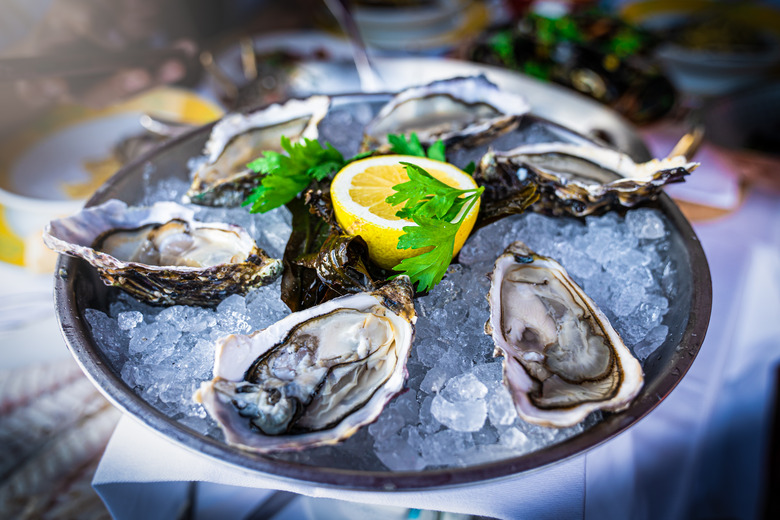Can Cats Eat Oysters?
Some cats love to beg for human food as much as any dog would. If your cat is on hand when you're enjoying an oyster dinner or appetizer, you might wonder, "Can cats eat oysters?" There's no harm in giving your healthy cat a few pieces of cooked oyster as a treat. However, feeding too many, too regularly, or the wrong kind can result in tummy troubles or a trip to the vet.
Can cats have oysters?
Can cats have oysters?
Oysters aren't poisonous to cats, but they do contain substances that can make your cat ill. Raw oysters can be contaminated with norovirus, which can make both cats and people sick. Oysters are bivalves that feed by filtering water to obtain nutrition from the environment and commonly harbor both viruses and bacteria that are killed by thorough cooking.
Raw oysters are also a source of thiaminase, an enzyme that breaks down the B-vitamin thiamine and renders it inactive. If you fed your cat a significant portion of oysters day after day, your cat would get lethargic and confused and develop an enlarged heart. However, a bite or two of your oysters on the half-shell is unlikely to cause any issues.
Oysters aren't the only raw seafood that your cat shouldn't eat. Thiaminase is present in a variety of raw shellfish and fish, particularly carp. It's unlikely that your cat will develop problems unless he eats a diet rich in raw fish or seafood. Horsetail ferns and other plants can also contain thiaminase.
Oysters in a can
Oysters in a can
Heat cooking inactivates thiaminase and kills bacteria. Feeding your cat canned oysters as an occasional treat won't harm her. In fact, oysters are rich in nutrition that your cat needs.
Oysters are rich in trace minerals essential to your cat's health, making them a power-packed snack. One 3-ounce can of oysters contains 38 milligrams of calcium, 46 milligrams of magnesium, 195 milligrams of potassium, and 77 milligrams of zinc along with a plethora of trace minerals; vitamins A, B, C, D, E, and K; and other nutrients.
Although pets can suffer from zinc poisoning, it's very unlikely that your cat would eat enough oysters to experience zinc-related symptoms, such as vomiting, diarrhea, or orange-tinted feces. It's safe to feed your cat a small bit of oyster as a treat but avoid feeding your cat large amounts of canned oysters day after day to prevent toxic amounts of zinc from building up in her system.
Cats, oysters, and toxoplasmosis
Cats, oysters, and toxoplasmosis
Concerns over toxoplasmosis and pregnant women mostly center around the mom-to-be cleaning out the litter box. The Toxoplasma gondii parasite gets shed through a cat's fecal matter. You might think that your indoor cat is at zero risk of contracting the parasite, but if you're an oyster lover, you could be wrong.
Even if your cat doesn't have access to wild birds and mice — the common way most cats contract the parasite — foods such as oysters could pass it to your pet. Raw and undercooked oysters, clams, mussels, and other shellfish also present the risk of infecting your cat.
Once a cat is infected, he can shed the oocytes in his feces for up to three weeks afterward. The best prevention is to make sure your litter box is changed daily and avoid being the one to have to change it if you're pregnant. If you are the only one who can do so, wear disposable gloves and thoroughly wash your hands with soap and water afterward.
Alternatives to oysters
Alternatives to oysters
Although cats can eat clams, mussels, or other seafood in small amounts, the concerns are the same as they are with oysters. Although shellfish is nutrient-dense and has a flavor and aroma many cats crave, you need to determine whether oysters are something appropriate for your particular cat.
If it's a treat your cat is craving, check out high-value cat treats that will appeal to your pet and deliver a healthy boost of vitamins and minerals. Seafood-flavored options will let your kitty enjoy a special delight as part of a wholesome snack.
References
- Cornell University Department of Animal Science: Thiaminases
- Centers for Disease Control and Prevention: Oysters and Vibriosis
- National Library of Medicine: Detection of Feline Norovirus Using Commercial Real-Time RT-PCR Kit for the Diagnosis of Human Norovirus Infection
- Preventive Vet: Zinc Toxicity in Dogs & Cats
- U.S. Department of Agriculture: Mollusk, Oyster, Eastern, Canned
- Kansas State University: Veterinarian Clarifies Misconceptions About Toxoplasmosis, Offers Safety Tips
